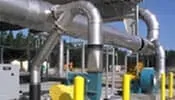


SCS Engineers provided system design, engineering and permitting support to the SSO Facility. Tasks included:
Another SSO Commercial Composting Facility near Rainier, WA, accepts various compostable feedstocks, including pre-shredded yard debris, yard debris, woodwaste and food waste. Feedstocks entering the site are characterized and weighed at the scale office, delivered to the tipping area and processed. This processing results in a wide assortment of odorous chemical compounds. SCS Engineers was retained by SSO to conduct an ambient odor study to determine what compounds from selected source components at the facility contribute most to the ambient odors at the facility, and what mitigation measures should be considered to reduce the ambient odor footprint at the site.
Our SCS Tracer professionals implemented a limited field sampling plan and the data collected were used to compile an odor emissions profile for each significant source found at the site. This emissions profile was then applied to dispersion modeling using approved modeling techniques to gauge the magnitude of potential offsite odor impacts.
Off-site impacts were estimated using an Environmental Protection Agency-approved AERMOD dispersion model to establish an odor footprint for the facility. Historical meteorological data representative of the Olympia area, and the characteristic chemical species determined in field sampling phases, provided data input for the model. Finally, potential mitigation methods for control of off-site odor impacts were identified. These mitigation options include operational changes (turning piles at optimal times), managing the receiving area, roofing the facility and aerating the detention pond.
The methodology employed by SCS Engineers for this study was subsequently adopted by the Washington Department of Ecology for its odor assessments.